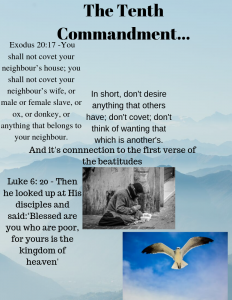The ‘poor’ and ‘poor in spirit’ are mentioned in the beatitudes of Matthew and Luke respectively. There is a largely distinguishable difference between being poor when it comes to wealth, possessions, property, and being poor in spirit. Being poor in spirit is a bit more complex than poor in the other sense. For starters, any person, regardless of their non-spiritual wealth, can be poor in spirit. The single person on the planet who is the richest and wealthiest in possessions can be poor in spirit. As can any person with very little wealth, possessions or property, be poor in spirit. So then, what must define spiritual poverty?
To answer this question, I believe it would be easiest to take a look at what defines spiritual wealth, then simply take a gander down to the opposite end of the spectrum to define spiritual poverty. Furthermore, how can we begin to define wealth in the spiritual sense? Well, let’s start with the Ten Commandments. The Ten Commandments are, in layman’s terms, a set of rules, or laws a man named Moses was given a long time ago on top of a mountain in the desert.
We can compare this set of rules to laws we have in the modern society of today. A person who is obedient to all of the laws, regulations, responsibilities, and expectations of a society would surely have some form of wealth.
For example, a man is a resident of a rural area since birth, lives his life according to the law to adulthood, and accumulates wealth along the way. Meanwhile, another man goes against the law at every turn, and lives his life being scorned and shunned by his peers. By the time the unlawful man reaches adulthood and keeps with his unlawful life, he would surely be jailed, and be in poverty for not being a proper member of a functioning part of society.
It can be inferred that the same way of life is reflected unto those with spiritual wealth, or lack thereof. A person that follows the Ten Commandments, attends masses, takes part in the sacraments, and lives their life according to the laws of the Catholic faith, is no doubt comparable to a hypothetical person who lives their life according to the laws, regulations, expectations, and responsibilities of their hypothetical society.
Meanwhile, the opposite is happening on the other end of the spectrum. Those poor in spirit would surely be comparable in fortune to a person poor in the form of money or property.
